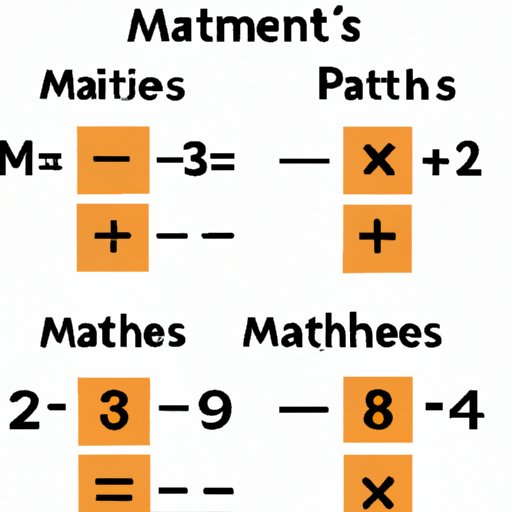
Introduction
Mathematics can be a challenging subject for many people, but with the right guidance, it can be both fun and interesting. Understanding the concept of exponents is essential in making significant progress in math. In this guide, we will explore the basics of dividing exponents, how to use the rule of quotients for dividing exponents, common mistakes made when dividing, real-world applications, and games to make math learning enjoyable. This guide is for anyone who wants to understand and master the fundamentals of dividing exponents.
Breaking Down the Basics: A Beginner’s Guide to Dividing Exponents
Before exploring the complex aspects of dividing exponents, it is necessary to define what they are and why they are essential. An exponent is a superscript number that represents how many times a number or variable must be multiplied by itself. Exponentiation is the process of multiplying a number by itself as many times as the exponent indicates. For instance, 5^4 is known as 5 raised to the power of 4, which means that we will multiply 5 four times: 5 x 5 x 5 x 5 = 625.
Division is the process of finding groups of equal sizes or sharing a quantity equally among a certain number of people. When dividing exponents, the number will have a smaller value when we subtract the exponents. For instance, (7^8) / (7^3) = 7^(8-3) = 7^5 = 16,807.
It is important to understand these basics before delving into complex exponent division problems. It is also crucial to master basic multiplying and dividing operations before attempting to divide exponents.
The Rule of Quotients: Understanding Exponent Division
The rule of quotients is a mathematical rule applied when dividing two numbers with the same base. When you divide the numbers, subtract the exponents to get a result. For instance, (2^5) / (2^3) = 2^(5-3) = 2^2 = 4.
Understanding the rule of quotients is particularly important when dealing with complex exponent division problems, and it is a concept that should be studied and understood. With practice, even the most intimidating problems can be broken down into easy-to-understand steps.
Dividing Exponents: Common Mistakes and How to Avoid Them
When dividing exponents, many common mistakes can be made. These mistakes can be avoided by starting with simple problems and slowly progressing to advanced ones.
One common error is forgetting to apply the rule of quotients. Always remember to subtract the exponents when the bases are the same.
Another common mistake is misplacing negative signs. When dealing with negative exponents, it can be easy to misplace the negative sign, resulting in incorrect answers. For instance, -5^(2) means -(5^2), which is -(25), not (-5)^2, which is 25.
A third common mistake when dividing exponents is confusing multiplication and division. It is essential to remember that when dividing numbers with the same base, the exponents should be subtracted rather than added.
Dividing Exponents: Real-World Applications
Exponents are not just limited to math textbooks and homework problems; they are used in many real-world situations. Science, engineering, and finance regularly use exponents to understand relationships between complex equations. For instance, in compound interest problems, exponents can be used to predict the future worth of investments over time. When dealing with scientific notation, exponents are used to express large or small numbers in a more simplified manner.
For example, the speed of light is about 299,792,458 meters per second, which can be expressed as 2.99792 x 10^8 m/s in scientific notation. This makes it easier to work with and compare such a large number with smaller ones.
Dividing Exponents: Math Games and Activities
Math can be fun when you add excitement and fun activities to it. There are numerous games and activities that can make learning about dividing exponents an enjoyable experience. Online math games and mobile apps can be an excellent way to practice and learn how to divide exponents.
For instance, the game Exponent Evasion is an interactive game that walks the player through the basics of dividing exponents while ensuring that they are having fun. Similarly, Dragonbox Algebra is an app that helps kids learn the fundamental concepts of algebra through creative games.
Additionally, you can create your flashcards or worksheets to practice dividing exponents. This approach is not only fun but also effective in recalling concepts and boosting memory retention.
Mastering Exponent Division: Tips from a Math Pro
As you progress through the complex world of exponent division, sometimes it might get a little bit tricky. That is why getting an expert’s opinion can be helpful. Some tips from experienced mathematics teachers, tutors, and professors include:
Understanding how negative exponents work. Often, students struggle with signs when working on negative exponents. Familiarizing yourself with negative exponents and how to manipulate negative signs is essential.
Moreover, setting up a equations chart with examples when working on a similar type of problem is essential. This helps break down the problem into simple components and makes it easier to solve the problem.
Finally, effective study habits such as reviewing class notes, regular practice routines, and visual aids can significantly improve mastering the basics of dividing exponents.
Conclusion
Dividing exponents, like any other mathematical concept, requires practice, patience, and discipline. Understanding the basics of exponent division, including the rule of quotients, common mistakes, and real-world applications, can help ensure that you have a strong foundation for more advanced mathematics. Continuing to study and practice with math games and activities can make learning more fun, and getting advice from experts can help when you feel stuck. So, keep practicing and remember that math can be enjoyable when approached in the right way.





